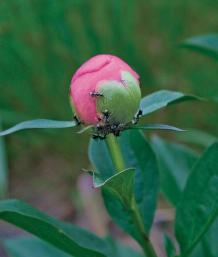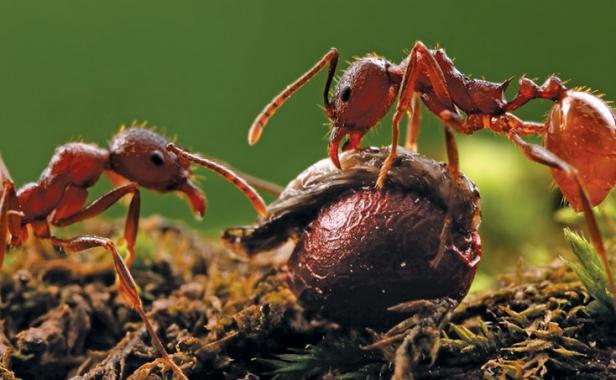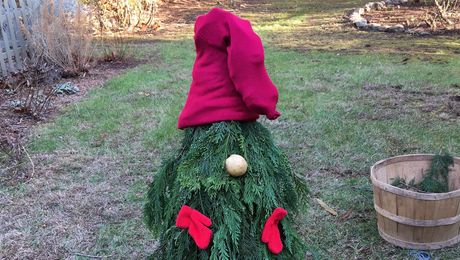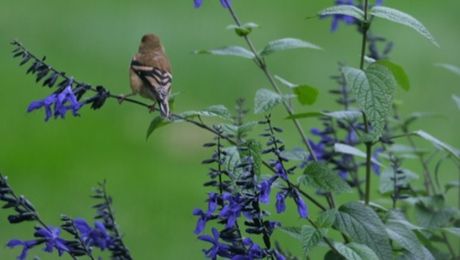Are Ants Bad For A Garden
How-To
Ants Aren't Your Enemy
If you think these little insects are pests, think again


Photo/Illustration: Steve Aitken
When you wander through your lawn or garden and stumble across an anthill, a small mound of soil molded into tiny pellets, it's often a gardener's first instinct to destroy it. You stomp and kick until the small hill disappears and the tiny ants scurry off. But by doing so, you're actually doing a disservice to your garden. Though most gardeners find these anthills a nuisance, they are our first clue to the important, helpful roles ants play in gardens and lawns—they're tiny rototillers. Tunneling ants turn over as much soil as earthworms do, aerating the soil and redistributing nutrients. Ants are also part of the world recycling crew: acting as scavengers, collecting dead insects and turning them into fertilizer for your soil.
Rather than being seen as pests, ants can be understood as our partners in gardening. One of the most easily observed and important roles that ants play is as seed dispersers. Here in the temperate eastern forests, ants disperse woodland spring wildflowers, such as bleeding heart (Dicentra spectabilis, USDA Hardiness Zones 3–9), trout lilies (Erythronium spp. and cvs., Zones 3–9), and most violets (Viola spp. and cvs., Zones 3–9). They conduct this same role with flowering plants across the country. This enterprise is so beneficial that plants appear to have adjusted the timing of flowering and fruiting to take advantage of high ant activity early in the year.
Smart seeds make ants into accidental gardeners

Ant-dispersed seeds, like those of Dutchman's breeches (Dicentra cucullaria), have specialist attractants called elaiosomes, or "fat bodies," that are rich in lipids. Ants collect seeds with elaiosomes, take them back to the nest, feed the elaiosomes to their larvae, and discard the undamaged seed on the nest's waste heap. The seeds are removed from competition with neighbors, protected from seed predators, and "planted" in the nutrient-rich environment of the ant-waste heap. This process makes a clear argument to keep ants around—if for no other reason than to act as the gardeners of the insect world.
Another advantage of having ants in your garden is protection from herbivores. Ants are attracted to the nectar found on the plant stem or sepals (not the nectar found in flowers that is used by pollinators). The ants patrol these plants and disturb herbivores and seed-eating insects by attacking them, by causing them to fall off the plants, or by interrupting feeding, egg laying, courtship, or molting. The ants crawling all over sticky peony buds in early summer, for example, protect them from enemies, and the ants are rewarded with a rich food source. Some plants also reward this protective role by housing ants in special structures, in addition to providing them with food rich in proteins, lipids, and carbohydrates.
Ant protection from predation is also beneficial for some of our most common insects. The caterpillars of some butterfly groups produce a sweet substance known as honeydew to attract ant protectors. The ants "farm" the caterpillars, sometimes even carrying them into the ant nests to complete development. This interaction can add more butterflies and birds to your garden as they become attracted to the greater insect activity.
A few garden ants are nuisance species. Native fire ants in the South sting and bite, making them unpleasant visitors to the garden. Nonnative red imported fire ants are a more serious problem. They are overabundant because they have escaped their natural competitors and predators in South America. They damage crops, cause a decline in native-ant populations, and even incapacitate machinery. Carpenter ants live in rotting wood but do little damage to live garden plants. Most ants, however, have no negative impact at all.
If you don't happen to have a pet anteater in your yard, you can control unwanted ants by pouring hot water into their nests, but we discourage it because of all of the important, positive roles that ants play in your garden. The ants, in fact, are eaten by other insects, spiders, frogs, lizards, birds, fish, and some mammals, forming an important part of food webs all over the world.
We are continually learning new ways that ants contribute to the ecosystem. Home gardeners can do worse than follow the biblical advice to observe the ant and be wise.
Get our latest tips, how-to articles, and instructional videos sent to your inbox.
Related Articles
The Latest
Design
Gardening With the Spirit of the Season
Long-time Garden Photo of the Day contributor Cherry Ong may be the poster gardener for the spirit of the season. It has become a tradition for Cherry to make wreaths…

Design
Build a Holiday Garden Gnome
After such a long and dreary year, we could all use a celebration. Add some cheer to your front yard this holiday season with an adorable holiday garden gnome built…

Garden Photo of the Day
Flowers and Visitors in Nancy's Garden
Today's photos are from Nancy Stewart. I live near Syracuse, New York. I've been gardening most of my adult life. (I'm now 84 years old.) I am getting more into…

Holiday Subscription Savings - Limited Time!
$10 for a year
of Fine Gardening Magazine
Subscribe Today
-

How-To
Giving Back Through Gardening: Part 2
Back in May, Fine Gardening committed to planning and planting a garden for Karen, an emergency department nurse. It was a small way to say thank you for the efforts…
Are Ants Bad For A Garden
Source: https://www.finegardening.com/article/ants-arent-your-enemy
Posted by: fergusonpainarompat1996.blogspot.com


0 Response to "Are Ants Bad For A Garden"
Post a Comment